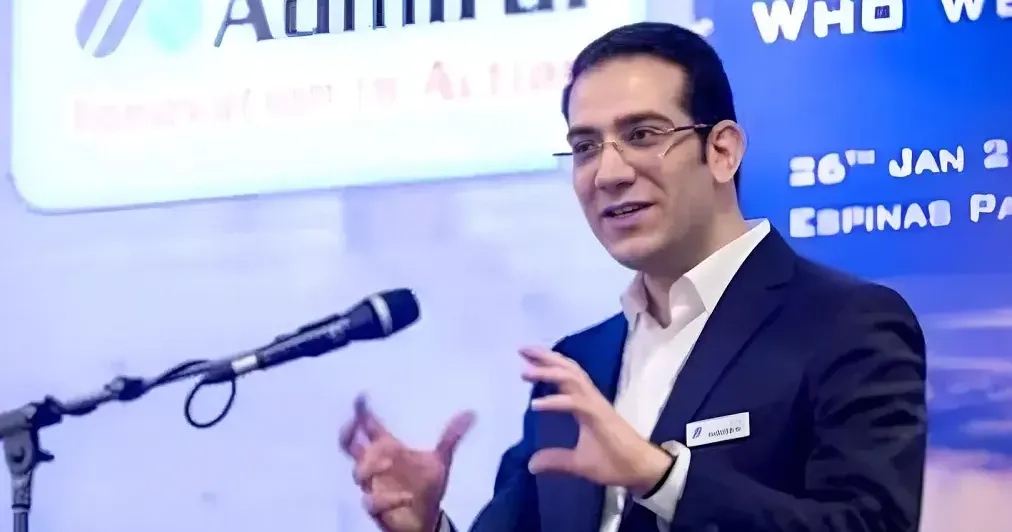
One of the rare images of Mohammad Hossein Shamkhani. Photo: Iran Wire.
On July 30, 2025, the US Treasury Department announced a series of new sanctions targeting more than 50 individuals, organizations and more than 50 vessels related to a giant Iranian shipping empire. This empire is accused of engaging in money laundering activities, transporting oil, goods and even weapons from Iran to foreign countries.
The central figure is Mohammad Hossein Shamkhani, who is quite secretive and rarely appears in public.
The son was advised to stay away from politics.
Mohammad Hossein Shamkhani is the son of Ali Shamkhani - former Minister of Defense of Iran, former Secretary of the National Security Council and currently a close advisor to Iran's Supreme Leader Ali Khamenei.
Ali Shamkhani was rumored to have been killed in the 12-day conflict between Iran and Israel last month. Shamkhani later reappeared, confirming that he was only injured.
According to Iran Wire, the Shamkhani family has a special position in Iran's military and security circles, but Mohammad Hossein once appeared with a completely opposite image.
In 2012, Mohammad Hossein made his television debut on an entertainment show called Glass Triangle, where his father kindly advised his son to “stay away from politics and avoid government involvement.” At that time, Mohammad Hossein looked very young, only about 20-25 years old, and appeared shy and quiet. Analysts speculate that Mohammad Hossein was born around 1985-1990, making him around 35-40 years old today.
More than a decade later, Mohammad Hossein’s name appears on the European Union’s (EU) sanctions list. On July 30, the US Treasury Department also added Mohammad Hossein and companies and individuals associated with this shipping empire to the largest sanctions list against Iran since 2018.
From family business to global transportation network
.jpg)
Hossein is the son of Ali Shamkhani (left), a close adviser to Iranian leader Ali Khamenei. Photo: Iran Wire.
According to the US Treasury Department, the shipping empire dates back to 2011, when Mohammad Hossein and his brother Hassan founded the Admiral company, which specializes in transporting goods and oil. Within five years, Admiral owned a fleet of ships with a capacity of more than 16,000 containers, operating mainly in the Persian Gulf and the Russian Far East. However, many of Admiral's ships traveled without turning on their positioning devices and often flew third-country flags to avoid being tracked by surveillance agencies, according to Iran Wire.
The first public incident was the 2022 seizure of the Admiral ship Kabul by Indian authorities for irregularities in its documentation. At the time, Ali Shamkhani tweeted cryptically: “Stories untold, for later.”
A few years later, Mohammad Hossein expanded his business to Dubai, founding the company Milavous, which is accused of being a key link in blending Iranian and Russian oil, falsifying origin documents and selling it to customers in both the East and the West – including Sinopec (China), Chevron (US) and BP (UK).
When the war in Ukraine broke out in 2022, Mohammad Hossein’s network not only continued to serve Iran’s oil exports but also reportedly became a vital logistics route for Russia. Ships belonging to the shipping empire allegedly transported weapons and drone parts from Iran through the Caspian Sea to the Russian port of Astrakhan, according to the US Treasury Department.
Intercontinental Money Laundering Machine
According to documents obtained by the US newspaper Bloomberg, the system controlled by Mohammad Hossein was operated through dozens of “shell” companies and investment funds stretching from Dubai, London to Singapore. One of them was the Ocean Leonid Fund – which received money from selling Iranian and Russian oil, then financed the purchase of weapons and logistics.
Several members of the network are believed to have purchased passports from Cyprus, Malta, and Dominica to conceal their nationalities. Mohammad Hossein is said to have used the aliases “Hector” and “Hugo Hayek” to sign contracts or open bank accounts. The US Treasury Department has launched its own investigation into JPMorgan over its suspected financial ties to the Ocean Leonid fund.
As of now, there are no specific conclusions and no legal actions or sanctions related to JPMorgan. However, Mohammad Hossein being added to the US Treasury sanctions list could force the bank to stop cooperating with Ocean Leonid.
.jpg)
Business partners of Mohammad Hossein's shipping empire include European countries such as England, France, Belgium, Italy, Switzerland... Photo: US Treasury Department.
Mohammad Hossein’s ships—which operate under front companies like Crios Shipping, Armada Global, and Marvise—regularly turn off their tracking devices and change their nationality and ownership information to avoid identification. Some of the vessels named, including the Sea Castle, Sea Anchor, BIGLI, and ACE, have transported oil or other prohibited goods to China and Russia. The U.S. Treasury Department determined that shipping documents were falsified or altered.
Iran's rebuttal and silence
Despite being accused of being a key link in the global sanctions-evading system, Mohammad Hossein’s lawyer has argued that his client does not own Milavous and has denied Bloomberg’s huge 2022 revenue of $15 billion. The lawyer said that his client’s company only earned “$9.2 million” in 2022.
In a 2022 complaint to Bloomberg, Mohammad Hossein's legal team called the investigative articles "fiction," accusing the American newspaper of lacking evidence and being politically motivated.
The Islamic Republic of Iran has remained silent on EU and US sanctions against Mohammad Hossein. Ali Shamkhani, Hossein's father, has been on the US sanctions list since 2020.
The network Mohammad Hossein built is now believed to control much of Iran's crude oil exports and play a central role in Moscow's flow of money to support the conflict in Ukraine, according to a statement from the US Treasury Department.
US officials acknowledged that the sanctions announced on July 30 targeted Russia's oil trade, but the priority remained focused on putting pressure on Iran, according to Politico.